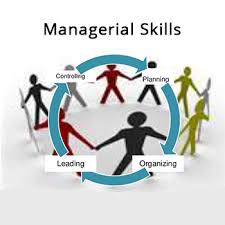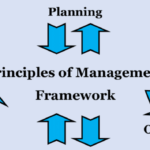Henri Fayol, a famous management theorist also called as the Father of Modern Management, identified three basic managerial skills – technical skill, human skill and conceptual skill.
Technical Skill
Knowledge and skills used to perform specific tasks. Accountants, engineers, surgeons all have their specialized technical skills necessary for their respective professions. Managers, especially at the lower and middle levels, need technical skills for effective task performance.
Technical skills are important especially for first line managers, who spend much of their time training subordinates and supervising their work-related problems.
Human Skill
Ability to work with, understand, and motivate other people as individuals or in groups. According to Management theorist Mintzberg, the top (and middle) managers spend their time: 59 percent in meetings, 6 percent on the phone, and
3 percent on tours.
Ability to work with others and get co-operation from people in the work group. For example, knowing what to do and being able to communicate ideas and beliefs to others and understanding what thoughts others are trying to convey to the manager.
Conceptual Skill
Ability to visualize the enterprise as a whole, to envision all the functions involved in a given situation or circumstance, to understand how its parts depend on one another, and anticipate how a change in any of its parts will affect the whole.
Creativity, broad knowledge and ability to conceive abstract ideas. For example, the managing director of a telecom company visualizes the importance of better service for its clients which ultimately helps attract a vast number of clients and an unexpected increase in its subscriber base and profits.
Other Managerial Skills
Besides the skills discussed above, there are two other skills that a manager should possess, namely diagnostic skill and analytical skill.
Diagnostic Skill: Diagnose a problem in the organization by studying its symptoms. For example, a particular division may be suffering from high turnover. With the help of diagnostic skill, the manager may find out that the division’s supervisor has poor human skill in dealing with employees. This problem might then be solved by transferring or training the supervisor.
Analytical Skill: Ability to identify the vital or basic elements in a given situation, evaluate their interdependence, and decide which ones should receive the most attention. This skill enables the manager to determine possible strategies and to select the most appropriate one for the situation.
For example, when adding a new product to the existing product line, a manager may analyze the advantages and risks in doing so and make a recommendation to the board
of directors, who make the final decision.
Diagnostic skill enables managers to understand a situation, whereas analytical skill helps determine what to do in a given situation.


